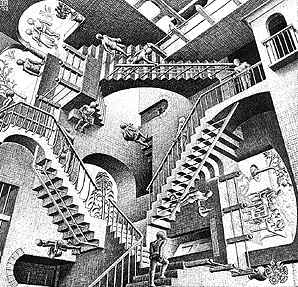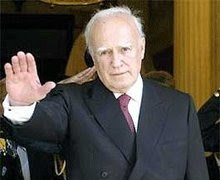
The Revolutionary Pleasure of
Thinking for Yourself
by various anonymous authors
Those who assume (often unconsciously) that it is impossible to achieve their life's desires-and, thus, that it is futile to fight for themselves--usually end up fighting for an ideal or cause instead. They may appear to engage in self-directed activity, but in reality they have accepted alienation from their desires as a way of life. All subjugations of personal desires to the dictates of a cause or ideology are reactionary no matter how "revolutionary" the actions arising from such subjugations may appear.
Yet, one of the great secrets of our miserable, yet potentially marvelous time, is that thinking can be a pleasure. Despite the suffocating effect of the dominant religious and political ideologies, many individuals do learn to think for themselves; and by doing so--by actively, critically thinking for themselves, rather than by passively accepting pre-digested opinions--they reclaim their minds as their own.
This is a manual for those who wish to think for themselves, a manual for creation of a personally (rather than ideologically) constructed body of critical thought for your own use, a body of thought which will help you to understand why your life is the way it is and why the world is the way it is. More importantly, as you construct your own theory, you will also develop a practice: a method to get what you want for your own life. Theory, then, must be either practical--a guide to action--or it will be nothing, nothing but an aquarium of ideas, a contemplative interpretation of the world. The realm of ideas divorced from actions is the eternal waiting room of unrealized desires. Forming your own practical theory, what could be called "self-theory," is intimately connected to achieving the realization of your desires.
Therefore, constructing your self-theory is a revolutionary pleasure. It is both a destructive and constructive pleasure, because you are creating a practical theory--one tied to action--for the destruction and reconstruction of this society. It is a theory of adventure, because it is based on what you want from life and on devising the means necessary to achieve it. It is as erotic and humorous as an authentic revolution.
Any system of ideas with an abstraction at its center--an abstraction which assigns you a role or duties--is an ideology. An ideology provides those who accept it with a false consciousness, a necessary component of which is other-directedness. This leads those who accept the ideology to behave as "objects" rather than "subjects," to allow themselves to be used rather than to act to attain their own desires. The various ideologies are all structured around different abstractions, yet all serve the interests of a dominant (or aspiring dominant) class by giving individuals (though the term hardly seems appropriate--"members of the herd" is perhaps more accurate) a sense of purpose in sacrifice, suffering, and submission.
Religious ideology is the oldest example: the fantastic projection called "God" is the Supreme Subject of the cosmos, acting on every human being as "His" object.
In the "scientific" and "democratic" ideologies of "free enterprise," capital investment is the "productive" subject directing world history--the "invisible hand" guiding human development. In order to prosper, the early capitalists had to attack and weaken the power that religious ideology once held. They exposed the mystification of the religious world and replaced it with the mystification of technology and commodity capitalism, wherein Profit becomes the Supreme Subject of the cosmos.
The 57 varieties of leninism are "revolutionary" ideologies in which the Party is the rightful subject entitled to dictate world history by leading its object--you, the proletariat--to the promised land through replacement of the corporate-capitalist "free enterprise" apparatus with a state-capitalist leninist apparatus.
The many other varieties of dominant ideologies can be seen daily. The new forms of religious mysticism help to preserve the status quo in a round about way. They provide a cheap and tidy way to obscure the vacuousness of daily life and, like drugs, make it easier to live, or rather exist, with this emptiness--and so prevent us from recognizing our real roles in the functioning of the socio-economic system.
All of these ideologies differ in the specific sacrifices they demand of you, the object, but all are structured in the same way. All demand an inversion of subject and object; things, abstractions, take on the human attributes of power and will, while human beings become things, tools to be used in the service of these abstractions (God, the dictatorship of the proletariat, the fatherland, etc., etc.). Ideology is upside down self-theory. It fosters acceptance of the separation of our narrow, daily lives from a world that appears totally beyond our control. Ideology offers us only a voyeur's relationship with the life of the world.
All abstraction-based ideologies demand duty, sacrifice for the cause; and every such ideology serves to protect the dominant social order. Authorities whose power depends upon docility must deny us our subjectivity, our conscious will to act for our own desires. Such denial comes in the form of demands for sacrifices for "the common good," "the national interest," "the war effort," "the revolution,".....
We rid ourselves of the blinders of ideology by constantly asking ourselves: How do I feel? How's my life? What do I want? Am I getting what I want? If not, why not? This is being conscious of the commonplace, being aware of your everyday routine. That real life exists--life in which you are active, a subject acting to achieve your desires--is a public secret that becomes less secret every day, as the breakdown of daily life constructed around abstraction-based ideologies becomes more and more obvious.
The creation of self-theory is based on thinking for yourself, on being fully conscious of your desires and of their validity. Authentic "consciousness raising" can only be the "raising" of people's thinking to the level of positive (non-guilty) self-consciousness, free of imposed morality in all its forms. This type of consciousness can be termed "radical subjectivity."
Conversely, what many leftists, therapy mongers, racism awareness trainers, and sisterizers term "consciousness raising" is the practice of beating people into unconsciousness with guilt-inducing, ideological billyclubs.
The path from self-negation to self-affirmation passes through point zero, the capital city of nihilism. This is the windswept still point in social space and time, the social limbo in which one recognizes that there is no real life in one's daily existence. A nihilist knows the difference between surviving and living.
Nihilists reverse their perspectives on their lives and the world. Nothing is true for them but their desires, their will to be. They reject all ideology in their hatred for the miserable social relations in modern society. From this reversed perspective they clearly see the upside-down world of commodity capitalism in which subject and object are inverted, and people and abstract concepts are converted into things, commodities to be sold. They see daily life as a theatrical landscape in which "everyone has their price," God (via televangelism) and happiness (smile buttons) become commodities, radio stations say they love you, and detergents have compassion for your hands.
Daily conversation offers sedatives such as, "You can't always get what you want," "Life has its ups and downs," and other cliches of the secular religion of survival. "Common sense" is just the non-sense of common alienation. Every day people are denied (and deny themselves) an authentic life and are sold back its representation.
Nihilists constantly feel the urge to destroy the system which destroys them. They cannot go on living as they are. Soon, most realize that they must devise a coherent set of tactics in order to transform the world.
But if a nihilist does not recognize the possibility for the transformation of the world, his or her subjective rage will ossify into a role: the suicide, the solitary murderer, the street hoodlum-vandal, the neo-dadaist, the professional mental patient... all seeking compensation for a life of dead time.
The nihilists' mistake is that they do not realize that there are other nihilists with whom they can work. Consequently, they assume that participation in a collective project of self-realization is impossible.
This project of collective self-realization, the changing of life itself through the transformation of social relations, can properly be termed "politics." Politics, however, also signifies a mystified, separate category of human activity, an isolated interest with its own specialists--politicians, political consultants, etc. It is possible to be interested (or not) in this type of politics just as it is possible to be interested (or not) in football, stamp collecting, music, or fashion. What people see as "politics" today is the social falsification of the project of collective self-realization; it has become a spectacle and a parody. And that suits those in power just fine.
Authentic collective self-realization is the revolutionary project. It is the collective transformation of social relations and the natural world according to the desires of all participants.
Similarly, "therapy" at present usually refers to attempts to "help" individuals "adjust" to their restrictive social roles and to the banality of daily life. Authentic therapy involves changing one's own life by changing the nature of social life. Therapy must be social if it is to be of any real consequence. Social therapy (the healing of society) and individual therapy (the healing of the individual) are linked together: each requires the other, each is a necessary part of the other.
For example, in present day society we are expected to repress our real feelings and play a role. This is called "playing a part in society" (how revealing that phrase is). Individuals put on "character armor" --a steel-like suit comprised of role playing, posing, and concealing one's desires as a defense against other individuals. Transforming social relations and surpassing the role-playing game requires the conscious decision of most if not all individuals to shed these roles and truly communicate; therefore, the end of individual role playing is directly related to the end of social role playing.
To think actively, critically, is to make your life--as it is now, and as you want it to be--the center of your thinking. This positive self-centering is accomplished by a continuous assault on externals, on the false issues ("support our troops"), false conflicts (e.g., those arising from notions of racial "superiority"), false identities ("American," "patriot," "Catholic," "white Christian"), and false dichotomies ("economic survival" versus "a clean environment") which permeate social life.
People are kept from analyzing the basic nature, the totality, of everyday life by the media focus--including "consumer" surveys and public opinion polls--on mere details: the spectacular trifles, the phony controversies, and ridiculous scandals. Are you for or against trade unions, cruise missiles, identity cards? What's your opinion of soft drugs, jogging, UFOs, progressive taxation, Michael Jackson's latest nose job, the royal family's sexual relations?
These are diversions, false issues. The only issue for us is how we live. There's an old Jewish saying, "If you have only two alternatives, then choose the third." It impels people to search for new perspectives. We can see the artificiality of false dichotomies by searching for that "third choice."
Being conscious that there is a third choice allows us to refuse to choose between two supposedly opposite, but equally repulsive, possibilities which are presented to us as the only possible choices. In its simplest form, this "third choice" consciousness is expressed by the person brought to trial for armed robbery and asked, "Do you plead guilty or not guilty?" "I'm hungry and unemployed," she replies. A more theoretical, but equally classic, illustration of this consciousness is the refusal to choose between the corporate-capitalist ruling classes of the West and the state-capitalist ruling classes of what's left of the Eastern bloc. All we need to do is to look at the basic social relations of production in the USA and Europe on the one hand, and China, North Korea, and Cuba on the other, to see that they are essentially the same: over there, as here, the vast majority work for a wage or salary in exchange for giving up control over their life's work, control over both what they produce and how they produce it. And, of course, what they produce in both East and West is then sold back to them as commodities.
In the West, the surplus value, or the value produced over and above the value of the workers' wages, is the property of the corporate management and stockholders, who keep up a show of domestic competition. In the East, the surplus value is the property of the state bureaucracy, which does not permit domestic competition. Big difference.
Like the false issues and false conflicts cited above, false questions are used to distract us from living in the present, from seeing the totality of existence. One example is the stupid conversational question, "What's your philosophy of life?" It poses an abstract concept of "life" that has nothing to do with real life because it ignores the fact that "living" is exactly what we are doing at the present moment, and our "philosophy of life" is clearly revealed by our actions.
False identities are perhaps an even more potent form of mystification. In the absence of real community, people cling to all kinds of phony social identities--they contemplate and attempt to emulate a huge variety of roles presented to them in school, church, and, especially, the "entertainment" media. These social identities can be ethnic ("Italian- American"), residential ("New Yorker"), nationalistic ("patriot"), sexual ("gay"), cultural ("Giants fan"), and so on; but all are rooted in a common desire for affiliation, for belonging.
Obviously being "black" is a much more real identification than being a "Giants fan," but beyond a certain point, such an identification only serves to mask one's real position in society; and in order to recognize that real position, you have to reject the false identities, false conflicts, and false dichotomies, and begin with yourself as the center. From there you can examine the material basis of your life, stripped of mystification.
An example: Suppose that you want a cup of coffee from the vending machine at work. First, there is the cup of coffee itself: that involves the workers on the coffee plantation, the ones on the sugar plantation and in the refineries, the ones in the paper mill, and so on. Then you have the workers who made the different parts of the vending machine and the ones who assembled it. Then the ones who extracted the iron ore and bauxite, smelted the steel, and work for the electric utility which supplies power to the machine. Then all the workers who transported the coffee, cups, and machine. Then the clerks, typists, and communication workers who coordinated the production and transportation. Finally, you have all the workers who produced all the other things necessary for the other ones to survive. That gives you a direct material relationship to several million people, in fact, to the immense majority of the world's population. They produce your life, and you help to produce theirs. In this light, all artificial group identities and special group interests fade into insignificance. Imagine the potential enrichment of your life that at present is locked up in the frustrated creativity of these millions of workers, held back by obsolete and exhausting methods of production, strangled by lack of control over their own productivity, warped by the insane rationale of capital-accumulation which pits one against all and makes life a mad scramble for economic survival. Here we begin to discover a real social identity--in people all over the world who are fighting to win control over their own lives we find ourselves.
Those who have a vested interested in the political and economic status quo continually present us with false choices, that is, with choices which preserve their power ("Vote Democratic!"/"Vote Republican! "--"But Vote!"). We are constantly being asked to choose sides in false conflicts. Governments, corporations, political parties, and propagandists of all kinds constantly present us with "choices" that are no choice at all. We are given the illusion of choice, but as long as those in power control what our "choices" will be ("choices" which we perceive as the only alternatives available to us), they will also control the outcome of our "decisions."
The new moralists love to tell those of us in the rich West how we will "have to make sacrifices," how we "exploit the starving children of the Third World." The choice we are given is between sacrificial altruism or narrow individualism. (Charities cash in on the resulting guilt.) Yes, by living in the rich, wasteful West we do exploit the poor of the Third World--but not personally, not deliberately. We can make some changes in our lives, boycott, make sacrifices, but the effects are marginal. We become aware of the false conflict with which we've been presented when we realize that under the global socio-economic system we, as individuals, are locked into our roles as "exploiters" just as others are locked into their global roles as the exploited. We have a role, but little power to change it--at least individually. Therefore, we reject the false choice of "sacrifice or selfishness" by calling for the destruction of the global social system whose existence forces that decision upon us. Tinkering with the system, or offering token sacrifices, or calling for "a little less selfishness," simply won't do. Charities and reformers never go beyond such false choices as "sacrifice" or "selfishness"--but if any true social progress is to be made, the rest of us must do so.
Those in power continually use such falsifications to divert and disempower us. By spreading myths like, "If we shared it all there wouldn't be enough to go around," they attempt to deny the existence of any real choices and to hide from us the fact that the material preconditions for social revolution already exist.
Any journey toward self-demystification must avoid the twin quagmires of absolutism and cynicism.
Absolutism is the total acceptance or rejection of all components of particular ideologies, or indeed, of any set of ideas or concepts. An absolutist cannot see any choice other than complete acceptance or complete rejection; s/he sees things purely as good or bad, black or white. The absolutist wanders along the shelves of the ideological supermarket looking for the ideal commodity, and then buys it lock, stock and barrel. But the ideological supermarket--like any supermarket--is fit only for looting. It is of more practical use to us to move along the shelves, rip open the packets, take out what looks authentic and useful, and dump the rest.
Cynicism is a reaction to a world dominated by ideology and "morality." Faced with conflicting ideologies, the cynic says, "A plague on both your houses." The cynic is as much a consumer as the absolutist, but one who has given up hope of finding the ideal commodity.
The process of constructive thinking is a process of continually adding to and modifying one's current body of self-theory as well as resolving contradictions between one's new thoughts and perceptions and one's previous beliefs. The resulting synthesis is thus more than the sum of its parts.
This synthetic method of constructing a theory is counter to the eclectic method in which one collects a rag bag of favorite bits from favorite ideologies without ever confronting the resulting contradictions. Modern examples include "anarcho-capitalism," "christian marxism," and liberalism in general.
If we are continually conscious of how we want to live, we can critically appropriate from anything: ideologies, culture critics, technoratic experts, sociological studies, even mystics (though the pickings will probably be slim). All the rubbish of the old world can be scavenged for useful material by those who want to reconstruct it.
The nature of modern society, unified globally through its capitalist economic system, makes necessary a self-theory which criticizes all areas in which socio-economic domination exists (i.e., both the corporate capitalism of the "free" world and the state capitalism of the "communist" world) as well as all forms of alienation (sexual poverty, enforced participation in the rat race for survival, etc.). In other words, we need a critique of the totality of daily existence from the perspective of the totality of our desires.
Opposed to this project are all the politicians and bureaucrats, preachers and gurus, city planners and policemen, reformers and leninists, central committees and censors, corporate managers and union honchos, male supremacists and feminist ideologues, landlords and eco-capitalists who work to subordinate individual desires to that hideous abstraction, "the common good," of which they are the supposed guardians. They are all forces of the old world-bosses, priests, and other creeps who have something to lose if people extend the game of seizing back their minds into seizing back their lives.
Revolutionary theory and abstraction-based ideologies are enemies, and every politically conscious person knows it.
By now it should be obvious that self-demystification and the creation of our own revolutionary theory do not eradicate our alienation; "the world," with its capitalist economic relations permeating every aspect of life, goes on and is reproduced every day with the acquiescence and assistance of billions of people.
Although this text has the creation of self-theory as its focus, we do not mean to imply that revolutionary theory can exist separately from revolutionary practice. In order to be consequential, to effectively reconstruct the world, practice must be based in theory, and theory must be realized in practice. The revolutionary project of ending alienation and transforming social relations requires that one's theory be nothing other than a theory of practice, realized in what we do and how we live. Otherwise theory will degenerate into an impotent contemplation of the world, and ultimately into a survival mechanism--an intellectual armor that acts as a buffer between the daily world and oneself. And if revolutionary practice is not the practice of revolutionary theory, it degenerates into, at best, altruistic militantism--"revolutionary" activity as one's social duty or role. At worst, it degenerates into pure gangsterism.
We don't strive for a coherent theory purely as an end in itself. For us, the value of coherency is that it makes it easier to think critically and effectively. For example, it's easier to understand future developments in social control if you have a coherent understanding of present-day social control ideologies and techniques.
Having a coherent theory makes it easier to put into practice your strategy for realizing your desires.
In the process of constructing self-theory, the last theories that must be dealt with (one hesitates to call them "ideologies," as they are not based in abstractions with their accompanying "shoulds" and "duties") are the ones that have the most resemblance to revolutionary self-theory. These are situationism and syndicalism.
The Situationist International (1958-1971) was an organization of theoretically oriented, ultra-left, European (especially French) marxists. Many believe, as did the original author(s) of this essay, that the situationists "made an immense contribution to revolutionary theory." That evaluation is, however, overly generous. Virtually all of the key insights attributed to situationist writers can be found in the works of earlier anarchists, social democrats, and philosphers such as Alexander Berkman, Emma Goldman, Oscar Wilde, George Bernard Shaw, Wilhelm Reich and Friedrich Nietzsche (though the insights in question were scattered and often were not developed with the rigor found in the better situationist texts). The primary reason that this is not widely recognized is that most of the early situationists and their followers came from marxist backgrounds and were simply not familiar with the vast body of non-marxist progressive writings produced in prior decades; and the younger situationist followers often have had very little in the way of political experience and are as unfamiliar with early progressive literature as were their marxist predecessors.
A secondary reason for the overestimation of the importance of the situationists is that situationism is a French ideology utilizing an arcane marxist-derived jargon ('poverty of...,' 'society of the spectacle,' 'reification,' 'dialectical,' etc., etc.); as well, virtually all situationist texts are written in a very difficult to follow, jargon-ridden, muddy style--which makes them inaccessible to most people. Thus, situationism has a great deal of snob appeal for those with intellectual pretensions. Once you've mastered the jargon and read (or claim to have read) the key (one is tempted to say "sacred") texts, you certainly at least appear to be an intellectual. Thus it's not surprising that "situationist" poseurs, 1atched as they are to their "situationist" roles and "intellectual" pretensions, often have little regard for truth and regard decent human behavior as "bourgeois"; it follows, then, that in political controversies they often resort to deliberate distortions, fabrications, and ad hominem attacks upon those who have the temerity to criticize their ideas. (Some, incredibly, have even used the slogan, 'the personal is political,' as an excuse for scurrilous personal attacks.) The destructive-and ultimately self~defeating~effects of these vicious tactics are so obvious as to need no further comment.
But perhaps the most critical~weakness of situationism is that it offers no coherent method for "getting from here to there," that is, from "the society of the spectacle" to the free society.
Having said this, it should be added that the great virtue of the situationist writers was that they presented their insights in a more or less coherent manner and expounded upon them at length. (The qualifer "more or less" is used due to the very low quality, stylistically, of almost all situationist texts.) At its best, situationist theory offered a critique of "spectacular" society, that is, society in which people are reduced to the level of passive observers and consumers rather than active participants. It made an extensive critique of how both ideology and commodification turn people into passive, alienated observers of their own lives. Thus, situationist theory is a body of critical thought which can be incorporated into one's own self-theory--but nothing more. Anything more--the unquestioning acceptance of situationist theories and the identification of oneself with those theories--is the ideological misappropriation known as situationism. Situationism can be quite the complete survival ideology, a defense against the wear and tear of daily life. And included in the ideology is the spectacular role of being a "situationist," that is, a radical jade and ardent esoteric.
The other body of ideas which bears a great deal of resemblance to revolutionary self-theory is, to use the term broadly, syndicalism. Variants include anarcho-syndicalism, revolutionary syndicalism, and council communism, with anarcho-syndicalism being the most important of the three.
Real self-management is the direct management (without any separate leadership) of social production, distribution, and communication by workers and their communities. The movement for self-management has appeared again and again all over the world in the course of social revolution: Russia in 1905 and 1917-1921; Spain in 1936-1939; Hungary in 1956; Algeria in 1960; Chile in 1972; and Portugal in 1975. The form of organization most often created in the practice of self-management has been workers' councils: sovereign assemblies of producers and neighbors that elect delegates to coordinate their activities. The delegates are not representatives, but carry out decisions already made by their assemblies. Delegates can be recalled at any time should the general assembly feel that its decisions are not being rigorously carried out. Partisans of all of the above-mentioned forms of syndicalism advocate such practices.
The great virtues of syndicalism are, first, that it seeks to destroy all coercive authority as well as the commodity (i.e., capitalist) economy. Second, it does provide a practical means of "getting from here to there." And third, it recognizes that the one essential function of social organization is to provide the economic base-production and distribution of goods and services-upon which all else rests. Syndicalism recognizes that this is the one area in which extensive organization (of the libertarian type described above) is needed, and that it's best to leave all other areas of life as free as possible from organizational influence. Virtually all critics of syndicalism, including the original author(s) of this pamphiet, miss this essential point. (It's certainly true that a thorough critique of all types of domination and mystification is necessary to social transformation, but one need only glance at the better syndicalist publications to see that at least some syndicalists are making such a critique.) Given the destruction of coercive authority (one of syndicalism's central goals) and adequate advance preparation (i.e., demystification), it would be absurd not to expect an explosion of creativity in all areas of life-- art, music, writing, architecture, family relations, sexual relations, community structure, etc., etc.
There are, however, two great dangers in syndicalism. The first is that many syndicalists develop tunnel vision: they become so obsessed with labor struggles and self-managed economic schemes that they not only fail to analyze non-workplace-related forms of domination and mystification, but they often act as if such problems do not even exist. Thus, if this syndicalist tendency would succeed in its aims, it could well help to produce a self-managed society in which other-than-economic forms of domination and mystification still exert their baleful influences--for example, it's easy to envisage a worker-controlled economic system which coexists with religious mystification, homophobia, and sexism. This would be contrary to anarchist principles, but many syndicalists are syndicalists first and anarchists (or "antiauthoritarians") second, which is more than a bit like the tail wagging the dog.
The second danger is related to the first: syndicalists sometimes forget that syndicalist organizations are just a means to an end. They sometimes develop a bad case of organizational fetishism; this can be termed "organizationitis"--an intellectual hallucination in which means and ends are reversed, in which the syndicalist organization is perceived as an end in itself, as being more important than its goal (the free society). Sadly, in some cases that goal seems to be entirely forgotten. And, even more sadly, "organizationitis" sometimes--but not inevitably-- leads to an even worse disease, bureaucratization.
But these are not condemnations of syndicalist theory; they simply show that even the best theory is, in itself, no guarantee that its holders will always act in accord with its principles or will develop insights which go beyond those contained in the theory. This isn't terribly surprising. We all live in the world of commodity capitalism, and it would be shocking if we weren't burdened to a greater or lesser degree with the character traits such a life engenders; and it would be equally shocking if these character traits didn't cause problems in syndicalist organizations --indeed, in organizations of any type, including the most informal.
Still, the situation is far from hopeless. A high degree of personal awareness among participants can reduce the dangers of organizationitis and bureaucratization. As well, there are many procedural devices which are very effective at reducing such problems; these include decentralization, mandatory rotation of offices, term limitations, strict delimitation of responsibilities, and immediate recallability. With such safeguards, participation in common projects of self-liberation is more than feasible; it's desirable.
The world can only be turned right side up by the conscious collective activity of those who construct a theory of why it is upside down. Spontaneous rebellion alone is not sufficient. Without adequate advance preparation, the old world will simply reappear after any rebellion, embedded as it is in the psyches of the fabled "people." An authentic revolution can only occur if there is a coherent and practical mass movement of self-conscious individuals in which all of the mystifications of the past are being consciously swept away.
Notes
This essay was originally published in the United States in 1975 by
The Spectacle under the title
"Self-Theory: the pleasure of thinking for yourself." An extensively revised edition was published in London in 1985 by
Spectacular Times under the title
"Revolutionary self-help: a beginner's manual," and it has appeared twice since then in American periodicals under the title
"Revolutionary Self-Theory"; in 1989 it was published in a slightly revised edition by OVO, and in 1992 in a further revised edition by
No Longer Silent (NLS). This edition is an extensively rewritten and somewhat expanded version of the text which appeared in NLS.
As the editor of No Longer Silent commented, "...at this point it's fair to say that 'RST' has been penned by multiple authors, which is as it should be. Hopefully this trend will continue as future editions of this text appear. After all, the propaganda, literature, and so forth that we produce should not be considered as immutable tomes, determining the language and boundaries within which we are expected to interpret our experiences, but rather as fluid and alterable, reflecting our experience of reality as we are."
This is entirely in keeping with the sentiments of the previous authors/editors who stated, "...the ideological supermarket--like any supermarket--is fit only for looting. It is more productive for us if we move along the shelves, rip open the packets, take out what looks authentic and useful, and dump the rest."
In fact, that is exactly the approach which I've taken while editing this text: I've retained those portions which were useful and insightful, but I've also jettisoned a lot of waste material, including almost all of the marxist/situationist jargon plus a number of statements (particularly in the concluding section) which were factually incorrect or simply missed the point; as well, I've cleaned up the text by eliminating a number of non sequiturs and hopelessly fuzzy statements and by using terms (e.g., "ideology") in a more precise manner than in the previous editions of this work. What I've done, essentially, is to take a situationist tract and translate it into plain English.
I've also introduced a certain amount of new material which contradicts some of what I've deleted. Thus, it's quite possible-in fact quite probable-that the authors/editors of the previous versions of this essay would take strong exception to some of the changes I've made. While I regret that my alterations and additions may upset the original author(s), the point of this pamphlet is to get people to think for themselves; and I believe that the changes I've made increase the effectiveness of the pamphlet in that regard.
But despite the changes in this edition, the central thesis of this essay remains unchanged: that all genuine revolutionary impulses and activities stem directly from the desires of individuals, not from any ideologically imposed sense of "duty" with its attendant guilt, self-sacrifice, and self-deadening "shoulds."
As the previous authors/editors of this pamphlet have chosen to remain anonymous (or pseudonymous), the editor of this edition shall likewise remain so.
This text is not copyrighted. Please feel free to reproduce it.














































